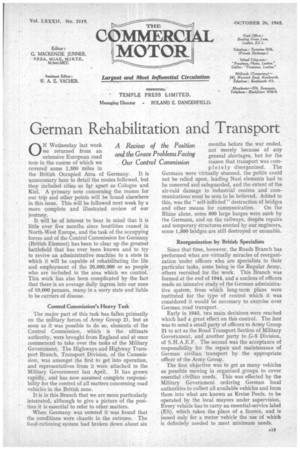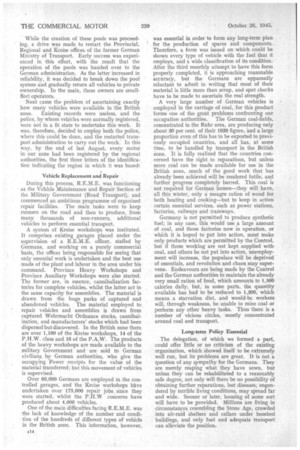German Rehabilitation and Transport
Page 15

Page 16

If you've noticed an error in this article please click here to report it so we can fix it.
ON Wednesday last week we returned from an extensive European road tour in the course of which we covered some 1,500 miles in the British Occupied Area of Germany. It is unnecessary here to detail the routes followed, but they included cities so far apart as Cologne and Kiel. A primary note concerning the reason for our trip and other points will be found elsewhere in this issue. This will be followed next week by a more complete and illustrated review of our journey.
It will be of interest to bear in mind that it is little over five months since hostilities ceased in North-West Europe, and the task of the occupying forces and of the Control Commission for Germany (British Element) has been to clear up the greatest battlefield that has ever been known and to try to revive an administrative machine to a state in which it will be capable of rehabilitating the life and employment of the 20,000,000 or so people who are included in the area which we control.• This work has also been complicated by the fact that there is an average daily ingress into our zone of 10,000 persons, many in a sorry state and liable to be carriers of disease.
Control Commission's Heavy Task The major part of this task has fallen priMarily on the military forces of Army Group 21, but as soon as it was possible to do so, elements of the Control Commission, which is the ultimate authority, were brought from England and at once commenced to take over the tasks of the Military Government. The Highways and Highway Transport Branch, Transport Division, of the Commission, was amongst the first to get into operation, and representatives from it were attached to the Military Government last April. It has grown rapidly, and has now assumed complete responsibility for the control of all matters concerning road vehicles in the British zone.
It is in this Branch that we are more particularly interested, although to give a picture of the position it is essential to refer to other matters.
When Germany was entered it was found that the conditions were chaotic in the extreme. The food-rationing system had broken down about six months before the war ended, not merely because of any general shortages, but for the reason that transport was completely disorganized. The Germans were virtually stunned, the police could not be relied upon, leading Nazi elements had to be removed and safeguarded, and the extent of the air-raid damage to industrial centres and cornmunications'must be seen to be believed. Added to this, was the " self-inflicted " destruction of bridges and other means for communication. On the Rhine alone, some 800 large barges were sunk by the Germans, and on the railways, despite repairs and temporary structures erected by our engineers, some 1,300 bridges are still destroyed or unusable.
Reorganization by British Specialists Since that time, however, the Roads Branch has performed what are virtually miracles of reorganization 'under officers who are specialists in their particular tasks, some being in the Regular Army, others recruited for the work. This Branch was formed at the end of 1944, and a nucleus of officers made an intensive study of the German administrative system, from which long-term plans were instituted for the type of control which it was considered it would be necessary to exercise over German road transport.
Early in 1945, two main decisions were reached which had a great effect on this control. The first was to send a small party of officers to Army Group 21 to act as the Road Transport Section of Military Government, and _another party to ,G-5 Division, of S.H.A.E.F. The second was the acceptance of responsibility for the repair and maintenance of German civilian transport by the appropriate officer of the Army Group.
The first objective was to get as many vehicles as possible moving in organized groups to cover essential civilian needs. This was effected by the Military Government ordering German local authorities to collect all available vehicles and form them into what are known as Kreise Pools, to be operated by the local mayors under supervision. Every vehicle has to carry an essential-service label (ES), which takes the place of a licence, and is issued only for a motor vehicle the use of which is definitely needed to meet minimum needs. While the creation of these pooh was proceeding, a drive was made to restart the Provincial, Regional and Kreise offices of the former German Ministry of Transport. Early success was experienced in this effort, with the result that the operation of the pools was handed over to the German administration. As the latter increased in reliability, it was decided to break down the pool ' system and gradually return all vehicles to private ownership. In the main, these owners are smallfleet operators.
Next came the problem of ascertaining exactly how many vehicles were available in the British zone. Existing records were useless, and the police, by whom vehicles were normally registered, were not in a fit state to undertake this work. It was, therefore, decided to employ both the police, where this could be done, and the restarted transport administration to carry out the work: In this way, by the end of last August, every motor in our zone had been registered by the regional authorities, the first three letters of the identification indicating the• region in which it was based..
Vehicle Replacement and Repair During this process, R.E.M.E, was functioning as the Vehicle Maintenance and Repair Section of the Military Government (Road Transport), and commenced an ambitious programme of organized repair facilities. The main, tasks were to keep runners on the road and then to produce, from many thousands of non-runners, additional vehicles to perform essential transport.
A system of Kreise workshops was instituted. It comprises existing garages placed under the supervision of a R.E.M.E. officer, staffed by Germans, and working on a purely commercial basis, the officer being responsible for seeing that only essential work is undertaken and the best use made of the plant and labour in the area under his command. Province Heavy Workshops and Province Auxiliary Workshops were also started. The former are, in essence, cannibalization factories for complete vehicles, whilst the latter act in the same capacity for assemblies. The material is drawn from the huge parks of captured and abandoned vehicles. The material employed to• repair vehicles and assemblies is drawn from captured Wehrmacht Ordnance stocks, cannibalization, and manufacturers' stocks which had been dispersed but discovered. In the British zone there are over 1,100 of the Kreise workshops, 14 of the P.H.W. class and 16 of the P.A.W. The products of the heavy workshops are made available to the military Government and • are sold to German civilians_ by German authorities, who give the occupying Power receipts for the value of the material transferred; but this movement of vehicles is supervised.
Over 60,000 Germans are employed in the controlled garages, and the Kreise workshops have undertaken over 175,000 repair jobs, since they were started, whilst the P.H.W concerns have produced about 4,000 vehicles.
One of the main difficulties facing R.E.M.E. was the lack of knowledge of the number and condi tion of the hundreds of different types of vehicle in the British zone. This information, however, A14 was essential in order to form any long-term plan for the production of spares and components.. Therefore, a form was issued on which could be shown every type of vehicle with the fuel that it employs, and a wide classification of its condition. After the third monthly attempt to have this form properly completed, it is approaching reasonable accuracy, but the Germans are apparently reluctant to admit in writing that most of their material is little more than scrap, and spot checks have to be made to ascertain the real strength.
A very large number of German vehicles is employed in the carriage of coal, for this product forms one of the great problems confronting our occupation authorities. The German coal-fields, concentrated in the Ruhr area, are producing only about 30 per cent. of their 1939 figure, 'and a large proportion even of this has to be exported to previously occupied countries, and all has, at some time, to be handled by transport in the British zone. It is fully realized that the countries concerned have the right to reparations, but unless more coal can be made available for use in the British zone, much of the good work that has already been achieved will be rendered futile, and further progress completely barred. This coal is not required for German homes—they will have, all this winter, only a meagre ration of wood for both heating and cooking—but to keep in action certain essential services, such as power stations, factories, railways and tramways.
Germany is not permitted to produce synthetic fuel; in any case, this would use ,a large amount of coal, and those factories now in operation, or which it is hoped to put into action, must make only products which are permitted by the Control, but if those 'working are not kept supplied with coat, and others be not put into action, unemployment will increase, the populace will be deprived of essentials, and revolution and chaos may supervene. Endeavours are being made by the Control and the German authorities to maintain the already very small ration of food, which amounts to 1,500 calories daily, but, in some parts, the quantity available has had to be reduced to 1,300, which means, a starvation diet, and would-bc workers will, through weakness, be unable to mine coal or perform any other heavy tasks. Thus there is a number of vicious circles, mostly concentrated around coal and transport.
Long-term Policy Essential The delegation, of which we formed a part, could offer little or no criticisth of the existing organization, which showed itself to be extremely well run, but its problems are great. It is not a question of any sympathy for the Germans. They are merely reaping what they have sown, but unless they can be rehabilitated to a reasonably safe degree, not only will there be no possibility of obtaining further reparations, but diseases, engendered by terrible living conditions, may spread far and wide. Sooner or later, housing of some sort will have to be provided. Millions are living in circumstances resembling the Stone Age, crowded into air-raid shelters and cellars under bombed buildings, and only fuel and adequate transport can alleviate the position.




















































